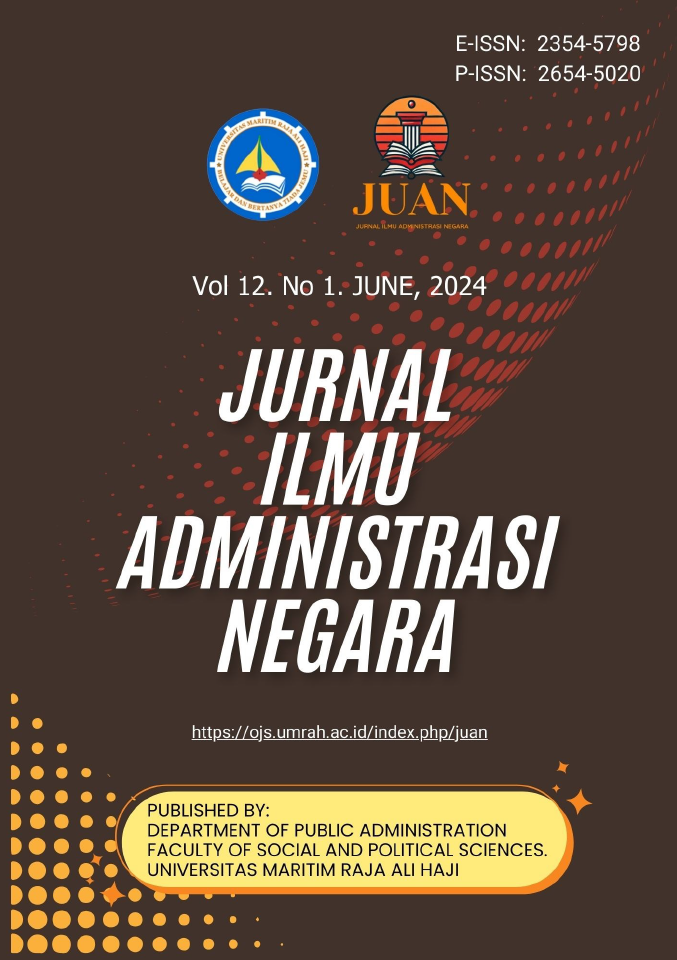Implementation of Good Governance in Health Services at the UPTD Mental Hospital of Bangka Belitung Islands Province
DOI:
https://doi.org/10.31629/juan.v12i1.6818Keywords:
Good Governance, Implementation, Health ServicesAbstract
This research discusses the implementation of good governance in health services at the UPTD Regional Mental Hospital, Health Service of the Bangka Belitung Islands province. With indicators of the principle of public accountability, the principle of legal certainty and the principle of public transparency. This research aims to find out how Good Governance is implemented in Health services at the UPTD Regional Mental Hospital, Health Service of the province of Bangka Belitung Islands and the factors that influence the Implementation of Health Services. This research is qualitative research with descriptive methods carried out by the UPTD of the Regional Mental Hospital of the Bangka Belitung Islands Provincial Health Service. The results of this research show that the implementation of Good Governance in Health services at the UPTD Regional Mental Hospital, Health Service of the Bangka Belitung Islands province is quite good but not yet optimal, especially the timeliness of services seen from the principle of public accountability, from the principle of legal certainty it is quite good but not yet optimal because there are still discrimination in services provided and the principle of public transparency is seen to be quite good. This is influenced by several factors, including: Moral and ethical principles of hospital employees, the absence of hospital regulations that regulate legal guarantees for patients and employees and there is still miscommunication between hospital employees and patients regarding the flow of health services.
Downloads
References
Alum, E. U., Obeagu, E. I., Ugwu, O. P., Samson, A. O., Adepoju, A. O., & Amusa, M. O. (2023). Inclusion of nutritional counseling and mental health services in HIV/AIDS management: A paradigm shift. Medicine, 102(41), e35673.
Aps, C. (2013). Mewujudkan Good Governance Melalui Standar Pelayanan Minimal (Spm) Dinas Kesehatan Kota Gorontalo Asna. J Chem Inf Model, 53(9), 1689-1699.
Befus, E. G., Mølland, E., Helseth, S., Hagen, M., Stea, T. H., Nolte, S., & Haraldstad, K. (2024). The use of youth healthcare services and its association with health-related quality of life, physical and mental health and over-the-counter analgesics use in 13–19-year-old adolescents: a cross-sectional study. BMC Public Health, 24(1), 104.
Calundu, R. (2018). Manajemen Kesehatan (Vol. 1). Sah Media.
Djamal, M. (2015). Paradigma penelitian kualitatif.
Dwiyanto, A. (2021). Mewujudkan good governance melalui pelayanan publik. Ugm Press.
Ernanto, L. T. (2018). Evaluasi Kualitas Pelayanan Jiwa di Instalasi Rawat Jalan Rumah Sakit Jiwa Prof. Dr. Soerojo Magelang. JMAN jurnal mahasiswa Administrasi negara, 2(2), 52-65.
Ferreira, D. C., Vieira, I., Pedro, M. I., Caldas, P., & Varela, M. (2023). Patient satisfaction with healthcare services and the techniques used for its assessment: a systematic literature review and a bibliometric analysis. In Healthcare (Vol. 11, No. 5, p. 639). MDPI.
Fikri, Z. (2020). Impelementasi Kebijakan Pendataan Penduduk Non Permanen Di Kabupaten Bangka. JIAP (Jurnal Ilmu Administrasi Publik), 8(1), 216-236.
Idaiani, S. (2010). Kesehatan Jiwa di Indonesia dari Deinstitusionalisasi sampai Desentralisasi. Kesmas, 4(5), 2.
Javaid, M., Haleem, A., & Singh, R. P. (2023). ChatGPT for healthcare services: An emerging stage for an innovative perspective. BenchCouncil Transactions on Benchmarks, Standards and Evaluations, 3(1), 100105.
Lohr, K. N., & Steinwachs, D. M. (2002). Health services research: an evolving definition of the field. Health services research, 37(1), 15.
Ristiani, I. Y. (2020). Manajemen pelayanan publik pada mall pelayanan publik di Kabupaten Sumedang Provinsi Jawa Barat. Coopetition, 11(2), 325691.
Rosenstock, I. M. (2005). Why people use health services. The Milbank Quarterly, 83(4).
Sahoo, S., Sahoo, J., Kumar, S., Lim, W. M., & Ameen, N. (2023). Distance is no longer a barrier to healthcare services: current state and future trends of telehealth research. Internet Research, 33(3), 890-944.
Santosa, P. (2008). Administrasi publik teori dan aplikasi good governance.
Saryono & Anggraeni, D. M. (2010). Metode penelitian kualitatif dalam bidang kesehatan. Yogyakarta: Nuha Media.
Sihotang, E. (2014). Prinsip hukum dalam tata kelola rumah sakit.
Sugiyono, D. (2010). Metode penelitian kualitatif dan R&D. Bandung: Alfabeta, 33.
Syakrani, & Syahriani. (2009). Implementasi otonomi daerah dalam perspektif good governance. Pustaka Pelajar.
Taufiqurokhman, E. S. (2018). Teori dan perkembangan manajemen pelayanan publik. Univ. Udayana, 4.
Valderas, J. M., Starfield, B., Sibbald, B., Salisbury, C., & Roland, M. (2009). Defining comorbidity: implications for understanding health and health services. The Annals of Family Medicine, 7(4), 357-363.
Yin, R. K. (1999). Enhancing the quality of case studies in health services research. Health services research, 34(5 Pt 2), 1209.
Downloads
Published
Issue
Section
License
Copyright (c) 2024 Zakiyudin Fikri, Asmadi Asmadi, Dara Puspita Sari

This work is licensed under a Creative Commons Attribution-ShareAlike 4.0 International License.
You are free to:
- Share — copy and redistribute the material in any medium or format for any purpose, even commercially.
- Adapt — remix, transform, and build upon the material for any purpose, even commercially.
- The licensor cannot revoke these freedoms as long as you follow the license terms.
Under the following terms:
- Attribution — You must give appropriate credit, provide a link to the license, and indicate if changes were made . You may do so in any reasonable manner, but not in any way that suggests the licensor endorses you or your use.
- ShareAlike — If you remix, transform, or build upon the material, you must distribute your contributions under the same license as the original.
- No additional restrictions — You may not apply legal terms or technological measures that legally restrict others from doing anything the license permits.














